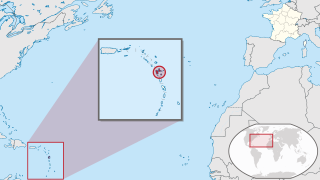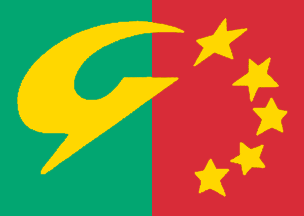
Guadeloupe is an overseas department of France in the Caribbean. It consists of six inhabited islands—Basse-Terre, Grande-Terre, Marie-Galante, La Désirade, and two Îles des Saintes—as well as many uninhabited islands and outcroppings. It is south of Antigua and Barbuda and Montserrat and north of Dominica. The capital city is Basse-Terre, on the southern west coast of Basse-Terre Island; the most populous city is Les Abymes and the main centre of business is neighbouring Pointe-à-Pitre, both on Grande-Terre Island. It had a population of 395,726 in 2024.

France is divided into eighteen administrative regions, of which thirteen are located in metropolitan France, while the other five are overseas regions.

The French West Indies or French Antilles are the parts of France located in the Antilles islands of the Caribbean:

Basse-Terre is a commune in the French overseas department of Guadeloupe, in the Lesser Antilles. It is also the prefecture of Guadeloupe. The city of Basse-Terre is located on Basse-Terre Island, the western half of Guadeloupe.
The overseas departments and regions of France are departments of the French Republic which are outside the continental Europe situated portion of France, known as "metropolitan France". The distant parts have exactly the same status as mainland France's regions and departments. The French Constitution provides that, in general, French laws and regulations apply to French overseas regions the same as in metropolitan France, but can be adapted as needed to suit the region's particular needs. Hence, the local administrations of French overseas regions cannot themselves pass new laws. On occasion referendums are undertaken to re-assess the sentiment in local status.

The administrative divisions of France are concerned with the institutional and territorial organization of French territory. These territories are located in many parts of the world. There are many administrative divisions, which may have political, electoral (districts), or administrative objectives. All the inhabited territories are represented in the National Assembly, Senate and Economic and Social Council and their citizens have French citizenship and elect the President of France.
The French overseas collectivities are first-order administrative divisions of France, like the French regions, but have a semi-autonomous status. The COMs include some former French overseas colonies and other French overseas entities with a particular status, all of which became COMs by constitutional reform on 28 March 2003. The COMs differ from overseas regions and overseas departments, which have the same status as metropolitan France but are located outside Europe. As integral parts of France, overseas collectivities are represented in the National Assembly, Senate and Economic and Social Council. Though some are outside the European Union, all can vote to elect members of the European Parliament (MEPs). The Pacific COMs use the CFP franc, a currency pegged to the euro, whereas the Atlantic COMs use the euro itself. As of 31 March 2011, there were six COMs:

The Guadeloupe Communist Party is a political party in the French overseas department of Guadeloupe. The party publishes the newspaper Etincelle.

The Collectivity of Saint Martin, commonly known as simply Saint Martin, is an overseas collectivity of France in the West Indies in the Caribbean, on the northern half of the island of Saint Martin, as well as some smaller adjacent islands. Saint Martin is separated from the island of Anguilla by the Anguilla Channel. Its capital is Marigot.

Saint-Louis is a commune in the overseas department of Guadeloupe. Saint-Louis lies on the north of the island of Marie-Galante, and is the island's largest commune. Many beaches lie on the west coast of the commune.

Victorin Lurel is a French politician who represented the 4th district of Guadeloupe in the French National Assembly from 2002 to 2012. He also served as the President of the Regional Council of the French overseas department of Guadeloupe from 2004 until 2015. His term began on 15 August 2004 and was renewed on 14 March 2010. In May 2012, he was made the Minister of Overseas France in Jean-Marc Ayrault's cabinet and was replaced in the national assembly by his supplementary candidate Hélène Vainqueur-Christophe. However, on 23 March 2014, he lost the local elections in Vieux-Habitants, and as of 2 April 2014, he was not reappointed to the Valls Cabinet. On 13 December 2015 he lost the regional elections in Guadeloupe.

Marlenheim is a commune in the Bas-Rhin department and Grand Est region of north-eastern France.

United Guadeloupe, Solidary and Responsible, formerly known as United Guadeloupe, Socialism and Facts, is a political party in the French overseas department of Guadeloupe. The party was founded by Dominique Larifla, a former socialist member of parliament and former president of the Department Council of Guadeloupe. The party is close to the Modern Left and used to have a Senator sitting in the European Democratic and Social Rally. The party has one seat in the French National Assembly, in the group of the Socialist Party. The party also has one seat in the Senate. The party was also formerly aligned with the Left Radical Party and is now aligned with La République En Marche !.

Overseas France consists of 13 French territories outside Europe, mostly the remains of the French colonial empire that remained a part of the French state under various statuses after decolonization. Most, but not all, are part of the European Union.

The 4th constituency of Guadeloupe is a French legislative Constituency in the Overseas department of Guadeloupe. Since 2022, is represented by Élie Califer of the Socialist Party. Guadeloupe is composed of four Constituencies.
Lucie Julia is the pen name of Huguette Daninthe was a Guadeloupean writer, women's rights activist and social worker. Julia wrote in both Creole and French and was the recipient of the L'Hibiscus d'Or prize of the Institute Jeux Foraux de la Guadeloupe for poetry, as well as the Prix littéraire des Caraïbes for one of her novels. She was the first caseworker in Guadeloupe's Health Department, and for many years was one of the few trained social workers on the island.











